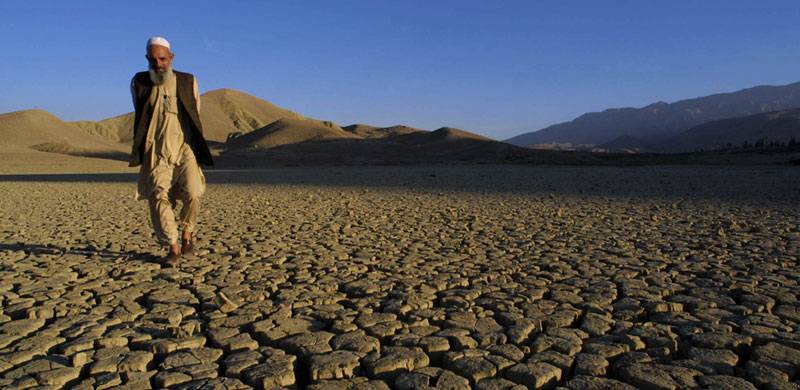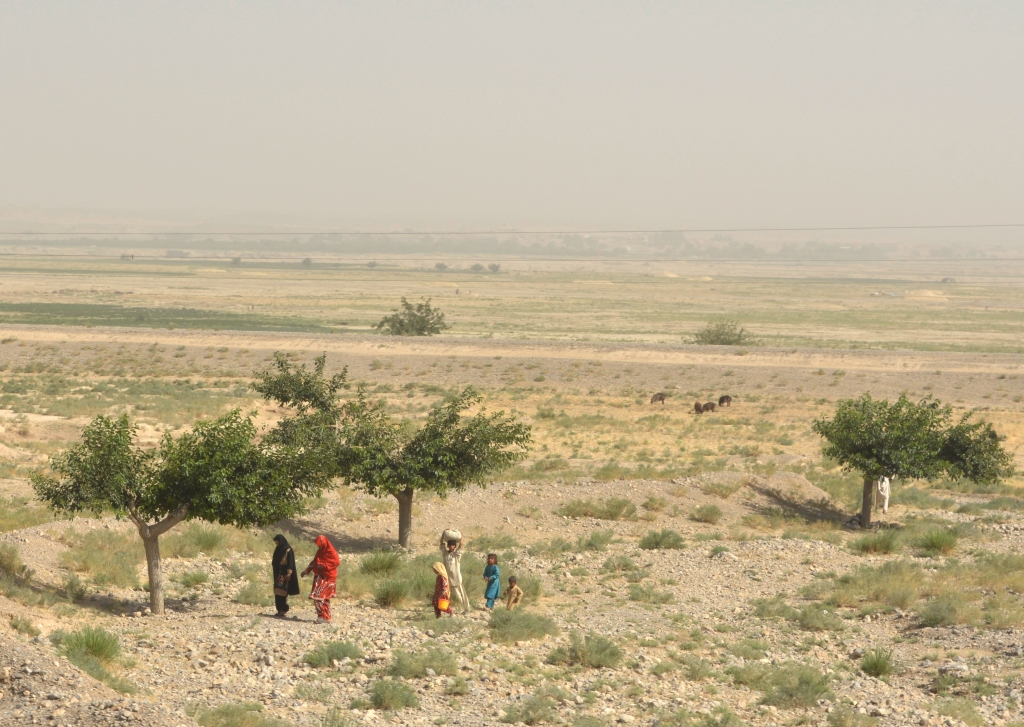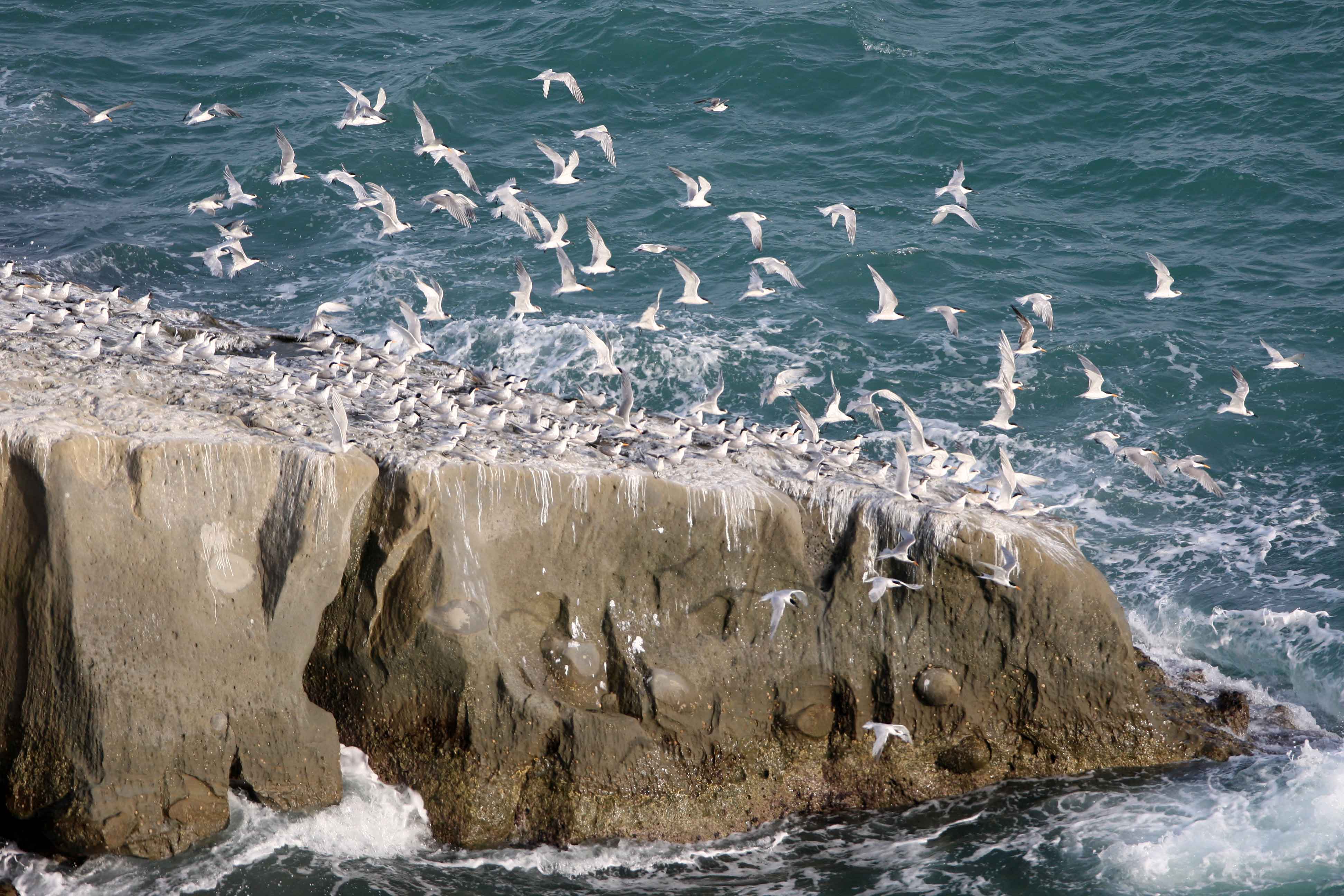
Climate change is increasingly becoming a serious threat to the world. According to Global Climate Risk Index, developing countries, including Pakistan, contribute very little to the world’s greenhouse gases. And Pakistan is among top ten countries exposed to climate change.
Like other parts of the world the severe impacts of climate change are also occurring in Pakistan. For instance, the heat waves in Karachi in June 2015 claimed approximately 12,000 lives and left over 40,000 people with heatstroke and other illnesses. It was a clear sign of climate change. Similarly, Balchistan and Sindh provinces have faced huge floods in 2010 and 2012 that had claimed thousands of lives and inflicted losses worth billions of rupees in property and infrastructure damages.
With the passage of time, climate change is showing its nasty face in the shape of drought, untimely rain- and snow-falls, smog and strong winds throughout Pakistan. Balochistan’s Kech district witnessed hottest day in the history of Pakistan on May 28th, 2017, when the mercury shot up to 53.5°C.

According to Intergovernmental Panel on Climate Change (IPCC) report human activities are assessed to have caused approximately 1.0°C of global warming above pre-industrial levels, with a likely range of 0.8°C to 1.2°C, and global warming is likely to reach 1.5°C between 2030 and 2052 if it continues to increase at the current rate.
IPCC report says impacts on natural and human system from global warming have already been observed, and many land and ocean ecosystems and some of the services they provided have already changed due to global warming.
Poverty and difficulties are expected to rise in some populations as global warming increases; limiting global warming to 1.5°C, compared with 2°C, could reduce the number of people both exposed to climate-related risks and vulnerable to poverty by up to several hundred million by 2050.
Pakistan had ratified Paris climate change agreement and vowed to trim down emissions by 2030. However, a lot is needed to be done to avoid serious complications of climate change that has already caused havoc in various sectors, including: increasing poverty, posing dreadful impacts on health, livelihoods, food security, water supply and economic growth. IPCC’s report warns that if we could not limit temperature to 1.5°C, it would show devastating consequences in every sector.
Balochistan province that is covering almost 44 percent landmass of total Pakistan, as well as a long coastal belt, is facing the brunt of climate change as its agriculture and livestock sectors, which are mainstay of economy of the province, are badly affected due to long drought, low precipitation and desertification. Its pastures are dried and number of orchards of different fruits have dehydrated while the ground water table is depleting at faster rate owing to excessive pumping for agriculture, drinking and other purposes. The degradation of agriculture and livestock is increasing poverty, food insecurity and malnourishment among children since huge population of Balochistan lives in scattered communities dependent of agriculture and livestock.
The temperature of different cities of Balochistan is showing surprise increase particularly its capital Quetta which was once famous for being coolest city of the country and is now witnessing high temperatures in summer and winter has shortened. In various parts of Balochistan, the growers are experiencing change in crops as unlike the past some crops are being cultivated in areas which were once not suitable for them.

In order to address the environment and climate change challenges in accordance with the IPCC’s report, Balochistan government has formed Balochistan Environmental Protection Council (BEPC). The council has different members hailing from government and private sectors besides environmental experts.
BEPC in its maiden moot thoroughly deliberated upon climate change and other environmental issues faced by Balochistan. It changed the nomenclature of the department from Environment Department to Climate Change and Environment aiming at work on climate change in accordance with international patterns. The council has decided to create environment fund which will be spent on improvement of environment.
Balochistan’s agriculture and livestock sectors need urgent rescue as over 70 percent of people’s economy is directly or indirectly linked with these two sectors. There is urgent need of establishment of a task force of technical experts from Agriculture Department to come up with a plan of changing cropping pattern in all ecological zones, introducing trickle and drip irrigating system to consume less water.
Many heads of major industries such as oil & gas, refineries, steel mills, ship breaking, cement, banking, plastic manufacturing etc need encouragement on the part of government to ensure Corporate Social Responsibility as many countries, including India, have made this mandatory.
Couple of days back Balochistan Chief Minister, Jam Kamal had tweeted a link of a report “The science is clear: Dirty farm water is making us sick”, and issued directive for complete ban on using sewerage water for cultivation which is causing fatal diseases and illness to human life.
Unfortunately, Quetta is the hub where vegetables are cultivated with dirty water at its different locations. The previous governments also took notice of this practice but after sometime the same practice resumed.
Hopefully, the initiative taken by present government, Balochistan Environmental Protection Council and Climate Change and Environment Department of Balochistan, will work actively to steer out the province from the environmental challenges, take concrete and researched oriented steps for revival of agriculture and livestock sectors.
Like other parts of the world the severe impacts of climate change are also occurring in Pakistan. For instance, the heat waves in Karachi in June 2015 claimed approximately 12,000 lives and left over 40,000 people with heatstroke and other illnesses. It was a clear sign of climate change. Similarly, Balchistan and Sindh provinces have faced huge floods in 2010 and 2012 that had claimed thousands of lives and inflicted losses worth billions of rupees in property and infrastructure damages.
With the passage of time, climate change is showing its nasty face in the shape of drought, untimely rain- and snow-falls, smog and strong winds throughout Pakistan. Balochistan’s Kech district witnessed hottest day in the history of Pakistan on May 28th, 2017, when the mercury shot up to 53.5°C.

According to Intergovernmental Panel on Climate Change (IPCC) report human activities are assessed to have caused approximately 1.0°C of global warming above pre-industrial levels, with a likely range of 0.8°C to 1.2°C, and global warming is likely to reach 1.5°C between 2030 and 2052 if it continues to increase at the current rate.
IPCC report says impacts on natural and human system from global warming have already been observed, and many land and ocean ecosystems and some of the services they provided have already changed due to global warming.
Poverty and difficulties are expected to rise in some populations as global warming increases; limiting global warming to 1.5°C, compared with 2°C, could reduce the number of people both exposed to climate-related risks and vulnerable to poverty by up to several hundred million by 2050.
Pakistan had ratified Paris climate change agreement and vowed to trim down emissions by 2030. However, a lot is needed to be done to avoid serious complications of climate change that has already caused havoc in various sectors, including: increasing poverty, posing dreadful impacts on health, livelihoods, food security, water supply and economic growth. IPCC’s report warns that if we could not limit temperature to 1.5°C, it would show devastating consequences in every sector.
Balochistan province that is covering almost 44 percent landmass of total Pakistan, as well as a long coastal belt, is facing the brunt of climate change as its agriculture and livestock sectors, which are mainstay of economy of the province, are badly affected due to long drought, low precipitation and desertification. Its pastures are dried and number of orchards of different fruits have dehydrated while the ground water table is depleting at faster rate owing to excessive pumping for agriculture, drinking and other purposes. The degradation of agriculture and livestock is increasing poverty, food insecurity and malnourishment among children since huge population of Balochistan lives in scattered communities dependent of agriculture and livestock.
The temperature of different cities of Balochistan is showing surprise increase particularly its capital Quetta which was once famous for being coolest city of the country and is now witnessing high temperatures in summer and winter has shortened. In various parts of Balochistan, the growers are experiencing change in crops as unlike the past some crops are being cultivated in areas which were once not suitable for them.

In order to address the environment and climate change challenges in accordance with the IPCC’s report, Balochistan government has formed Balochistan Environmental Protection Council (BEPC). The council has different members hailing from government and private sectors besides environmental experts.
BEPC in its maiden moot thoroughly deliberated upon climate change and other environmental issues faced by Balochistan. It changed the nomenclature of the department from Environment Department to Climate Change and Environment aiming at work on climate change in accordance with international patterns. The council has decided to create environment fund which will be spent on improvement of environment.
Balochistan’s agriculture and livestock sectors need urgent rescue as over 70 percent of people’s economy is directly or indirectly linked with these two sectors. There is urgent need of establishment of a task force of technical experts from Agriculture Department to come up with a plan of changing cropping pattern in all ecological zones, introducing trickle and drip irrigating system to consume less water.
Many heads of major industries such as oil & gas, refineries, steel mills, ship breaking, cement, banking, plastic manufacturing etc need encouragement on the part of government to ensure Corporate Social Responsibility as many countries, including India, have made this mandatory.
Couple of days back Balochistan Chief Minister, Jam Kamal had tweeted a link of a report “The science is clear: Dirty farm water is making us sick”, and issued directive for complete ban on using sewerage water for cultivation which is causing fatal diseases and illness to human life.
Unfortunately, Quetta is the hub where vegetables are cultivated with dirty water at its different locations. The previous governments also took notice of this practice but after sometime the same practice resumed.
Hopefully, the initiative taken by present government, Balochistan Environmental Protection Council and Climate Change and Environment Department of Balochistan, will work actively to steer out the province from the environmental challenges, take concrete and researched oriented steps for revival of agriculture and livestock sectors.
